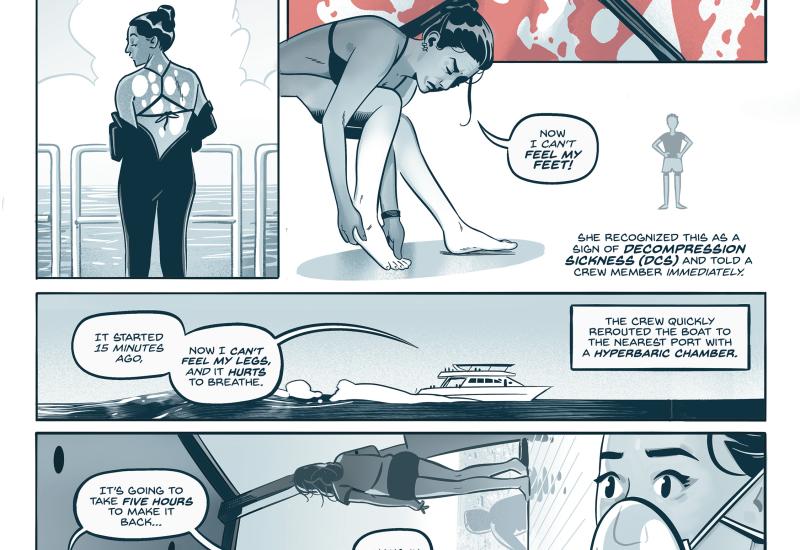Fall From Grace
February 2007
Bill tasted blood. That was his first sensation, followed by disorientation and severe pain. He tried to speak and found that he could not move his jaw. His face felt odd, and blood was pooling all around him. Trying to get up, he recognized where he was. Dive bags and scuba tanks surrounded him, and he felt the weight of his own gear on his back. But he could not remember how he had gotten here, or what could possibly be causing his intense, throbbing headache. The boat crew were kneeling on the deck next to him, urging him to stay still. Still groggy, Bill tried to push himself upright only to slump back down in hard agony.
The Diver
Bill was in his mid-thirties, in excellent physical condition and a very avid diver with 15 years of experience. He'd even been certified as an instructor, but lacked the time to teach. Still, he was quite proud of his knowledge and was always happy to share tips and "shortcuts" with other divers.
The Dive
Bill drove to one of his favorite diving destinations, a trip that had become almost routine. As was his habit, he preassembled his gear in the trunk of his car the night before so that he could be first on the dive boat and claim his favorite seat — the one in the front corner. Bill liked this spot because he was less distracted by briefings that he felt he no longer needed to hear. On this particular day he spent time verifying the programming on his high-tech computer and making minor adjustments to his gear, while the captain gave a detailed briefing about the boat and the entry and exit procedures to be used once they arrived at the site. As part of his briefing, the captain carefully directed the divers to put on all of their gear except for fins and walk to the back of the boat. There, they were to take a seat before putting on their fins and stepping onto the platform. Bill ignored the briefing. He had heard it dozens of times before and reasoned that he really did not need to hear it again. Besides, he had his own entry procedure in mind. The boat arrived at the site and the mate began a detailed briefing of dive conditions. While the other divers listened, Bill began suiting up to beat them into the water.
The Accident
The seas were a little choppy as Bill slipped into his BC and made one final check of his equipment. He put on his fins just as the briefing was ending, stood up and prepared to shuffle past the other divers to be first in the water. The crew had cautioned Bill several times before that it was not safe to walk on the boat deck in fins, but true to form, Bill argued that his way was better because he didn't have to sit down and stand up a second time. Holding his mask in his hand, Bill moved quickly toward the back of the boat. He only made it halfway. The boat pitched, Bill lost his footing and as he fell forward, his shoulder glanced off the side of the camera table and he fell face-first onto the deck. The momentum of the fall also brought his tank up high enough that the valve and regulator struck him in the back of the head. Bill remembered none of this after the accident. He was completely nonresponsive, and the crew members wisely decided not to move him once he hit the deck. As the mate was trying to do a field medical assessment, Bill regained consciousness and began struggling to get up. The mate finally convinced Bill to lie still until he could finish examining him, a task complicated by the blood pouring from Bill's wounded scalp and mouth.
Analysis
Experienced divers usually get themselves into trouble by rationalizing that the rules do not apply to them. In this case, Bill had made the same entry dozens of times without a problem. Every time he got away with ignoring the rule, he became a little more sure of himself. This is a very common syndrome in experienced divers and one that can frequently have tragic results. In this case, Bill discovered why the rule was in place. It is true that most divers can walk off the boat with their fins on most of the time. But occasionally, something loose on the deck or an unexpected shifting of the boat will grab the blade of the fin and cause a diver to lose his footing. This is precisely what happened to Bill as the boat rolled to the port side on a small swell. He lurched into the roll, catching his fin tip on a seat support. Because his other foot was also encumbered by a fin, he was unable to move it quickly enough to compensate for the loss of balance, and he fell forward.
A trip to the emergency room would reveal a dislocated jaw, several deep cuts to the inside of his cheek and a large laceration on the back of his head. The long-term consequences of Bill's shortcut were a number of stitches and a very painful recovery period once his jaw was popped back into place. Then there is the matter of Bill's pride; he relates that it's still on the mend.
Lessons for Life
Avoid walking on boat decks while wearing your fins. If you must walk in fins, walk backwards.
Follow the rules. They are not made for the perfect conditions that allow you to successfully shortcut them. The rules are written so that the unexpected does not hurt you.
Respect the boat crew. Hard-working dive professionals do not give briefings for their health. Their job is to impart information that will make your dive safer and more fun. The least you can do is listen.
February 2007
Bill tasted blood. That was his first sensation, followed by disorientation and severe pain. He tried to speak and found that he could not move his jaw. His face felt odd, and blood was pooling all around him. Trying to get up, he recognized where he was. Dive bags and scuba tanks surrounded him, and he felt the weight of his own gear on his back. But he could not remember how he had gotten here, or what could possibly be causing his intense, throbbing headache. The boat crew were kneeling on the deck next to him, urging him to stay still. Still groggy, Bill tried to push himself upright only to slump back down in hard agony.
The Diver
Bill was in his mid-thirties, in excellent physical condition and a very avid diver with 15 years of experience. He'd even been certified as an instructor, but lacked the time to teach. Still, he was quite proud of his knowledge and was always happy to share tips and "shortcuts" with other divers.
The Dive
Bill drove to one of his favorite diving destinations, a trip that had become almost routine. As was his habit, he preassembled his gear in the trunk of his car the night before so that he could be first on the dive boat and claim his favorite seat — the one in the front corner. Bill liked this spot because he was less distracted by briefings that he felt he no longer needed to hear. On this particular day he spent time verifying the programming on his high-tech computer and making minor adjustments to his gear, while the captain gave a detailed briefing about the boat and the entry and exit procedures to be used once they arrived at the site. As part of his briefing, the captain carefully directed the divers to put on all of their gear except for fins and walk to the back of the boat. There, they were to take a seat before putting on their fins and stepping onto the platform. Bill ignored the briefing. He had heard it dozens of times before and reasoned that he really did not need to hear it again. Besides, he had his own entry procedure in mind. The boat arrived at the site and the mate began a detailed briefing of dive conditions. While the other divers listened, Bill began suiting up to beat them into the water.
The Accident
The seas were a little choppy as Bill slipped into his BC and made one final check of his equipment. He put on his fins just as the briefing was ending, stood up and prepared to shuffle past the other divers to be first in the water. The crew had cautioned Bill several times before that it was not safe to walk on the boat deck in fins, but true to form, Bill argued that his way was better because he didn't have to sit down and stand up a second time. Holding his mask in his hand, Bill moved quickly toward the back of the boat. He only made it halfway. The boat pitched, Bill lost his footing and as he fell forward, his shoulder glanced off the side of the camera table and he fell face-first onto the deck. The momentum of the fall also brought his tank up high enough that the valve and regulator struck him in the back of the head. Bill remembered none of this after the accident. He was completely nonresponsive, and the crew members wisely decided not to move him once he hit the deck. As the mate was trying to do a field medical assessment, Bill regained consciousness and began struggling to get up. The mate finally convinced Bill to lie still until he could finish examining him, a task complicated by the blood pouring from Bill's wounded scalp and mouth.
Analysis
Experienced divers usually get themselves into trouble by rationalizing that the rules do not apply to them. In this case, Bill had made the same entry dozens of times without a problem. Every time he got away with ignoring the rule, he became a little more sure of himself. This is a very common syndrome in experienced divers and one that can frequently have tragic results. In this case, Bill discovered why the rule was in place. It is true that most divers can walk off the boat with their fins on most of the time. But occasionally, something loose on the deck or an unexpected shifting of the boat will grab the blade of the fin and cause a diver to lose his footing. This is precisely what happened to Bill as the boat rolled to the port side on a small swell. He lurched into the roll, catching his fin tip on a seat support. Because his other foot was also encumbered by a fin, he was unable to move it quickly enough to compensate for the loss of balance, and he fell forward.
A trip to the emergency room would reveal a dislocated jaw, several deep cuts to the inside of his cheek and a large laceration on the back of his head. The long-term consequences of Bill's shortcut were a number of stitches and a very painful recovery period once his jaw was popped back into place. Then there is the matter of Bill's pride; he relates that it's still on the mend.
Lessons for Life
Avoid walking on boat decks while wearing your fins. If you must walk in fins, walk backwards.
Follow the rules. They are not made for the perfect conditions that allow you to successfully shortcut them. The rules are written so that the unexpected does not hurt you.
Respect the boat crew. Hard-working dive professionals do not give briefings for their health. Their job is to impart information that will make your dive safer and more fun. The least you can do is listen.










